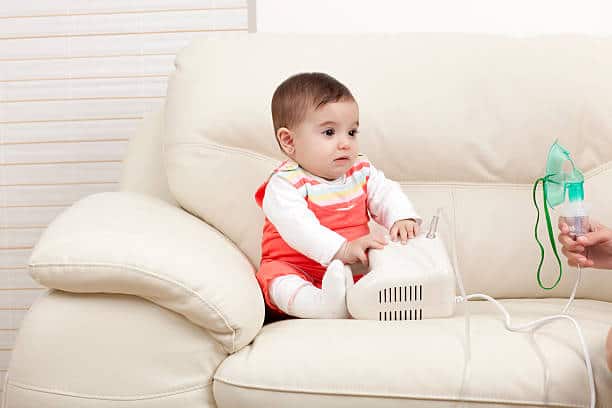Gasping for air is a concerning symptom in babies that should not be ignored. It is normal for babies to have irregular breathing patterns, but baby gasping for air while lying on back can indicate a problem with their airway or lungs.
Parents should be aware of the causes and symptoms of gasping in babies to ensure their child’s health and safety.
Babies have different breathing patterns than adults. They breathe faster and have shorter breaths, which can sometimes cause them to gasp or appear to be struggling to breathe.
However, if a baby is gasping for air while lying on their back, it could be a sign of a more serious problem.

Key Takeaways
- Gasping for air is a concerning symptom in babies that should not be ignored.
- Parents should be aware of the causes and symptoms of gasping in babies to ensure their child’s health and safety.
- Understanding a baby’s breathing patterns is important for recognizing when gasping may be a sign of a more serious problem.
1. Understanding Baby’s Breathing Patterns

Breathing is an essential function of life, and it is crucial to understand the breathing patterns of newborns, especially premature babies. A baby’s breathing pattern differs from that of an adult, and it takes some time for the baby’s respiratory system to mature.
Newborns breathe faster than adults, and their breathing rate can vary from 30 to 60 breaths per minute. Premature babies may have a higher breathing rate, and their breathing may be shallow.
They may also experience apnea, which is a pause in breathing for more than 20 seconds.
When a baby is lying on their back, they may gasp for air, which can be concerning for parents. However, this is a normal reflex that helps clear the baby’s airways.
The gasping should stop within a few seconds, and the baby will resume normal breathing.
It is essential to monitor a premature baby’s breathing closely, and they may require assistance from a breathing machine. A breathing machine helps deliver air and oxygen to the baby’s lungs and can help prevent apnea.
In summary, understanding a baby’s breathing pattern is crucial for parents, especially for premature babies. A baby’s breathing rate may be faster than an adult, and they may experience apnea.
Gasping for air while lying on their back is a normal reflex, and premature babies may require assistance from a breathing machine.
2. Common Causes of Gasping in Babies

Gasping is a common symptom in babies that can be caused by various factors. Here are some of the most common causes of gasping in babies:
Feeding Issues

Gasping can occur in babies who have feeding issues such as reflux, acid reflux, GERD (gastroesophageal reflux disease), or gastrointestinal reflux. These conditions can cause the baby to swallow air, which can lead to gasping.
Laryngomalacia

Laryngomalacia is a condition where the baby’s larynx is weak and collapses during breathing. This can cause gasping, especially during feeding or when lying on their back.
Apnea
Apnea is a condition where the baby stops breathing for a short period of time. This can cause gasping when the baby resumes breathing.
Respiratory Distress
Respiratory distress can be caused by various factors such as respiratory infections, upper respiratory infections, pneumonia, whooping cough, pertussis, croup, bronchitis, bronchiolitis, asthma, allergies, and viral infections. These conditions can cause the baby to have difficulty breathing, which can lead to gasping.
Meconium Aspiration Syndrome
Meconium aspiration syndrome occurs when the baby inhales meconium (the baby’s first bowel movement) into their lungs. This can cause gasping and other respiratory problems.
Aspiration Pneumonia
Aspiration pneumonia occurs when the baby inhales food, liquid, or other substances into their lungs. This can cause gasping and other respiratory symptoms.
Cold and Viral Infections
Cold and viral infections can cause the baby to have a stuffy nose and difficulty breathing, which can lead to gasping.
It is important to identify the underlying cause of gasping in babies and seek medical attention if necessary.
2. Symptoms to Watch Out For

When a baby is gasping for air while lying on their back, it can be a concerning situation for parents or caregivers. Some of the symptoms to watch out for include:
- Noisy breathing, such as wheezing or stridor
- Grunting or moaning sounds while breathing
- Retractions, where the skin between the ribs or under the ribcage pulls in with each breath
- Cyanosis or bluish discoloration of the skin, particularly around the lips, mouth, or fingertips
- Difficulty breathing or shortness of breath
- Coughing or frequent hiccups
- Spitting up or vomiting
- Feeding difficulties or refusal to eat
- Discomfort or pain, as indicated by crying or screaming
- Fever or other signs of illness
If a baby is experiencing any of these symptoms, it is important to seek medical attention right away. Gasping for air while lying on their back can be a sign of a serious respiratory or cardiac issue, and prompt treatment is essential to ensure the baby’s health and safety.
Parents and caregivers can also take steps to prevent gasping for air while lying on their back by ensuring that the baby is placed in a safe sleeping position, such as on their back with no pillows or blankets in the crib. Additionally, avoiding overfeeding and burping the baby regularly can help reduce the risk of gas and discomfort.
Overall, it is important to be aware of the symptoms associated with gasping for air while lying on their back and to seek medical attention if necessary. With proper care and attention, most babies can recover from respiratory or cardiac issues and go on to lead healthy, happy lives.
3. Role of Airway and Lungs

The airway and lungs play a crucial role in breathing and gas exchange in the body. The respiratory system is responsible for bringing oxygen into the body and removing carbon dioxide.
The airways, including the nostrils, larynx, bronchi, and bronchial tubes, are responsible for transporting air to the lungs.
When a baby is lying on their back, the airway can become obstructed, leading to gasping for air. Tracheomalacia, a condition where the cartilage in the trachea is weak, can also contribute to breathing difficulties.
In some cases, a baby’s lungs may not be fully developed, leading to respiratory distress syndrome.
It is essential to ensure that a baby’s airway remains clear and unobstructed while lying on its back. This can be achieved by placing the baby on a firm, flat surface and ensuring that the head is slightly elevated.
Additionally, parents should avoid placing any objects in the baby’s crib that could obstruct their airway.
In some cases, medical intervention may be necessary to address breathing difficulties in infants. If a baby is gasping for air or exhibiting other signs of respiratory distress, it is essential to seek medical attention immediately.
Overall, understanding the role of the airway and lungs is crucial in ensuring that infants can breathe properly while lying on their backs. By taking steps to maintain a clear airway and seeking medical attention when necessary, parents can help ensure their baby’s respiratory health.
4. Effects of External Factors

Various external factors can contribute to a baby gasping for air while lying on their back. These factors can include parental behavior, cigarette smoke, second-hand smoke, dry air, diet, and blockages.
Parental behavior can affect a baby’s breathing pattern. If parents put their babies to sleep on their stomachs, it can lead to breathing difficulties.
It is important for parents to put their babies to sleep on their backs to prevent breathing problems.
Cigarette smoke is another external factor that can affect a baby’s breathing. Smoking during pregnancy can cause low birth weight, premature birth, and respiratory problems.
Second-hand smoke can also cause breathing difficulties in babies.
Dry air can also lead to breathing problems in babies. Dry air can cause the nasal passages to become dry and irritated, making it difficult for babies to breathe.
Using a humidifier can help to add moisture to the air and prevent breathing difficulties.
Diet can also play a role in a baby’s breathing pattern. Certain foods can cause allergies or sensitivities that can lead to breathing difficulties.
It is important for parents to monitor their baby’s diet and avoid any foods that may cause breathing problems.
Blockages can also cause breathing difficulties in babies. Blockages can occur in the nasal passages or in the throat.
It is important for parents to monitor their baby’s breathing and seek medical attention if they suspect a blockage.
In conclusion, external factors can contribute to a baby gasping for air while lying on their back. It is important for parents to be aware of these factors and take steps to prevent breathing difficulties in their babies.
5. When to Consult a Pediatrician

If a baby is gasping for air while lying on their back, it is important to monitor the situation closely and seek medical attention if necessary. While occasional gasping or labored breathing can be normal in infants, it is important to be aware of the signs that indicate a more serious issue.
If a baby is experiencing frequent or prolonged episodes of gasping or labored breathing, it is important to consult a pediatrician. The doctor can perform a physical exam and may order further tests to determine the underlying cause of the symptoms.
Some medical conditions that may cause gasping or labored breathing in infants include upper respiratory tract infections, lower esophageal sphincter dysfunction, and esophageal ulcers. In some cases, surgery may be necessary to manage these conditions and improve the baby’s breathing.
If a baby is experiencing difficulty breathing, a pediatrician may recommend the use of a nasal aspirator to help clear the nasal passages. This can help to alleviate symptoms and improve breathing.
Overall, if a baby is gasping for air while lying on their back, it is important to seek medical attention if the symptoms persist or worsen. A pediatrician can help to determine the underlying cause of the symptoms and provide appropriate treatment and management options.
6. Caring for a Baby with Breathing Difficulties

Babies can experience breathing difficulties for a variety of reasons, including mucus build-up, choking, or inflammation of the organs. If your newborn baby is gasping for air while lying on their back, it is important to take action to ensure their safety and comfort.
One of the first things to consider is the baby’s position. Placing the baby on its back is recommended to reduce the risk of sudden infant death syndrome (SIDS), but it can also cause breathing difficulties.
To alleviate this, parents can try placing the baby on their side or stomach during supervised tummy time sessions, which can help clear mucus and improve breathing.
Another way to help a baby with breathing difficulties is to ensure they are burping after feedings. This can help release any trapped air in the baby’s stomach, reducing discomfort and pressure on the diaphragm.
If the baby is hyperventilating or experiencing severe breathing difficulties, it is important to seek medical attention immediately. In some cases, medical intervention may be necessary to clear the airways or address any underlying issues causing the breathing difficulties.
Overall, caring for a baby with breathing difficulties requires a combination of preventative measures, monitoring, and prompt action when necessary. By staying vigilant and taking steps to promote healthy breathing, parents can help ensure their baby’s safety and comfort.
Related: Baby Stiffens Legs When Lying Down
Frequently Asked Questions
What causes a baby to gasp for air while lying on their back?
Babies may gasp for air while lying on their back due to a variety of reasons. It could be due to an immature respiratory system, which is common in newborns. Other causes could be laryngomalacia, gastroesophageal reflux, or sleep apnea.
Is it normal for a baby to make gasping sounds while sleeping?
It is not uncommon for babies to make gasping or other noises while sleeping. However, if the gasping sounds are accompanied by other symptoms such as choking or difficulty breathing, it is important to seek medical attention.
What is laryngomalacia and how does it affect a baby’s breathing?
Laryngomalacia is a condition where the soft tissues of the larynx collapse during breathing, causing breathing difficulties. It is a common cause of noisy breathing in infants and is usually not serious. However, severe cases may require medical intervention.
How can reflux cause a baby to gasp for air?
Gastroesophageal reflux is a condition where stomach contents flow back up into the esophagus, causing irritation. This can lead to breathing difficulties, including gasping for air, especially after feeding when the baby is lying down.
What should I do if my baby is gasping for air after feeding?
If your baby is gasping for air after feeding, it is important to keep them upright for at least 30 minutes after feeding. You should also consult with your pediatrician to rule out any underlying medical conditions.
Can high-pitched gasping noises be a sign of a more serious condition in babies?
High-pitched gasping noises can be a sign of a more serious condition, such as a respiratory infection or obstructive sleep apnea. It is important to seek medical attention if your baby is experiencing these symptoms.

Iesha is a loving mother of 2 beautiful children. She’s an active parent who enjoys indoor and outdoor adventures with her family. Her mission is to share practical and realistic parenting advice to help the parenting community becoming stronger.
